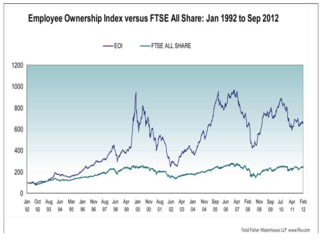“There is clear and unambiguous evidence to
show that employee ownership, particularly when combined with meaningful
employee participation, brings tangible economic benefits for companies. But
these gains are not just important to individual businesses, they have a direct
impact on the UK’s economic recovery.” Employee Ownership Association Impact Report March 2013
Nothing
new there then! We have all known all along that employee ownership is the best
way to build employee engagement and transform business results, and thus to
improve the national economy. Nevertheless these words from the latest Employee
Ownership Association report provide further evidence.
Of
course you might say, “Well they would say that, wouldn’t
they?” However, the evidence comes from the on-going Field Fisher Waterhouse
comparison of the Employee Owned Index (EOI) with the FTSE All-Share Index. Illustrated by the chart below this
shows that, although the EOI only grew at 3.4% compared to the All-Share
Index’s 3.7% this past quarter – hardly surprising considering the stock
market's record trading in the past few months – it has outperformed the latter
over the past ten years by an average of 10%.
In
fact interest in employee ownership is growing to such an extent that
Xavier Rolet, Chief Executive Officer,
London Stock Exchange Group PLC announced in July 2012 that the FTSE is
going to create its own EOI as, “A new FTSE Employee Share Ownership Index
will highlight some of the key benefits of encouraging employees to take an
active interest in the future success of the companies in which they work. This
new FTSE index will help raise awareness of how significant employee equity ownership
can be advantageous for both companies and employees.”
You
can download the report yourself from the EOA website and it will give you much
more information than I can in this blog. Just remember that, if you want to introduce employee ownership the Zealise employee ownership model can give you
all these benefits, without shares and at a fraction of the administrative cost
of traditional schemes.

